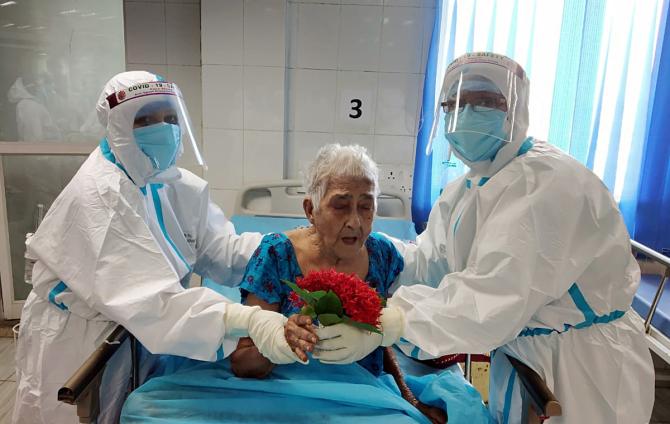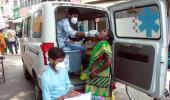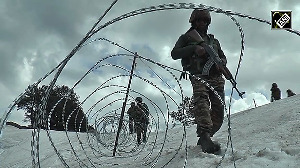About 20.8 per cent elders have lost either family members or friends due to COVID-19 and most of them believe that a better medical and health infrastructure could have saved these lives, according to a report that surveyed 3,526 elderly people in the country.

Marking the 'World Elder Abuse Awareness Day', HelpAge India on Tuesday released the findings of its six-city survey, 'The Silent Tormentor: COVID-19 and the Elderly', delving into the impact and challenges faced by India's elders during the pandemic.
The study surveyed 3,526 people in Delhi, Mumbai, Bengaluru, Hyderabad, Kolkata and Chennai.
It found out that 20.8 per cent of the people surveyed have lost either their family members or friends to Covid.
When asked what could have been done better to save these lives, 50.8 per cent said better medical and health infrastructure, 44.4 per cent said availability of vaccines and 38.7 per cent said availability of medicines and injections on time.
About 42.1 per cent of the respondents were most worried of being hospitalised if they were Covid-infected and 34.2 per cent were worried of being isolated.
Another major concern was the increasing financial dependency these elderly people had on others, with 41.1 per cent of those surveyed being dependent on their family members -- 70.2 per cent of them belonging to the age group of 80-89 years.
'Covid hugely impacted the income stream of the elderly, with 52.2 per cent elders saying their income has been impacted. Loss of jobs (34.9 per cent) and pay cut (30.2 per cent) of the family members being the top reasons,' the study said.
Inhibiting health conditions made it harder for the elders to cope during the pandemic, with 52.4 per cent of them suffering from joint pain, the most predominating health condition, while 44.9 per cent had difficulty in walking, 24.4 per cent had poor eyesight and 13.8 per cent had problems in remembering or suffered from a lack of concentration, which restricted their overall well-being.
'While 58.2 per cent elders were aware that a vaccine had been developed, 41.8 per cent were not aware that any vaccine has been developed. Of those aware, 78.7 per cent elders felt that getting vaccinated was really important,' the study said, noting that 66.6 per cent elders had got at least one dose of the Covid vaccine, though gaps remain as 39.4 per cent elders had not.
'What was disturbing was the misinformation about vaccination that most elders had. Of those aware of the COVID-19 vaccine, 61.2 per cent of elders felt that they will be completely immune to the disease after taking the vaccine.
'This not only will urge them to throw caution to the wind, but also put those around them susceptible to the virus if Covid-appropriate behaviours are not followed,' the study said.
About 43.1 per cent elders said elder abuse is prevalent in the society, while 15.6 per cent said they were victims of abuse, with disrespect (45.6 per cent) and beating or slapping (23.1 per cent) being the main forms of abuse, and 62.1 per cent felt that during COVID-19, the risk of getting abused has increased, the study said.
The main abusers were sons (43.8 per cent) and daughters-in-law (27.8 per cent), while 14.2 per cent said they were abused by their daughters.
On a ranking basis, emotional abuse (60.1 per cent) was the main form of abuse, followed by financial abuse (61.6 per cent) and physical abuse (58.6 per cent).
"We received more than 1,000 calls to our Elder Helpline relating to elder abuse, violence and disputes in the second wave, an increase of 18 per cent from the first. The helpline received almost 20,000 calls in total in the second wave, a 36-per cent increase since the first, with calls about counselling increasing by 111 per cent and requests for income support by 54 per cent.
"This is the reality we are living in today, COVID-19 has taken the primary role of the abuser, affecting elders in the worst way possible from all corners," said Dr Imtiaz Ahmed, Mission Head- Agecare, HelpAge India.
The study found that 48.1 per cent caregivers of those in the household setting are facing difficulty in managing their expenses, as many had lost their jobs and were coping with a decreased salary and 36 per cent found it difficult to give full attention or dedicate time to the elderly members in their families.
According to the caregivers, the major challenges faced by the elderly in their house from other family members during the pandemic was the need for more attention (37.4 per cent), behaviour of family members (33.6 per cent), financial insecurity (26 per cent) and inability of the family members on understanding the needs or emotions of the elderly (18.3 per cent).











 © 2025
© 2025